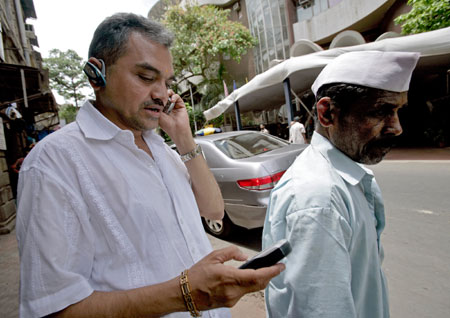World Business
3G licenses go under hammer
By Mehul Srivastava (China Daily)
Updated: 2010-04-10 10:24
 |
Large Medium Small |
|
 |
|
A trader makes a call on his cell phone outside the Bombay Stock Exchange in the central business districts of Mumbai, India. Price competition that's pushed call rates down to among the cheapest in the world and aggressive advertising have kept India's voice market growing. [PAUL HILTON / BLOOMBERG] |
India began auctioning 93 licenses to provide high-speed data to mobile phones and computers that may raise an estimated 500 billion rupees ($11.2 billion), helping reduce the nation's deficit. Bidders including Bharti, the nation's No 1 carrier, and the Indian unit of Newbury, England-based Vodafone are competing for a chance to raise revenue in a market with call rates among the world's lowest.
"Prices are likely to surprise on the upside given the tremendous interest," said Shubham Majumder, regional head of telecommunications research at Macquarie Group Ltd in Mumbai. Bidding will be "fierce" for three available Broadband Wireless Access (BWA) frequencies used to transmit data to computers, he said.
The broadband permits may raise $1 billion each, while the three nationwide third-generation licenses may bring $2 billion apiece, Majumder said in an interview. An additional 87 local licenses will also be sold simultaneously. The auction may raise 500 billion rupees, Minister for Communications and Information Technology Andimuthu Raja said in an interview broadcast by the ET Now television channel.
"Bidding on BWA right now is a way for telecom companies to ensure spectrum availability for future growth, when 4G technology gets widely deployed," Majumder said, referring to the technology that may allow future handsets to pick up data transmitted in the BWA bandwidth. Qualcomm Inc, the world's biggest maker of mobile-phone chips, is seeking a BWA license to stimulate demand for its products, the company said on March 30.
The auctions start with online bids for frequencies that may allow New Delhi-based Bharti and Vodafone Essar Ltd to offer 3G services for India's 545 million mobile subscribers. The sales may raise enough money to trim the nation's budget deficit by as much as half a percentage point, Nomura Holdings Inc said in February. Finance Minister Pranab Mukherjee on Feb 26 estimated the proceeds at 350 billion rupees.
"India is underserved by data and we see an opportunity in that," Vodafone Essar Chief Executive Officer Marten Pieters said in an interview with the Bloomberg-UTV channel. Bidders including Reliance Communications Ltd and Idea Cellular Ltd declined to comment. The government prohibits participating companies from discussing their bids.
Mumbai-based Kotak Institutional Equities Ltd had initially predicted the government could net $11.4 billion from the auction, with each BWA slot fetching its reserve price of 17.5 billion rupees, according to a March 15 report. After the bidders were disclosed by the Department of Telecommunications on March 19, Rohit Chordia, the Mumbai-based analyst who wrote Kotak's original report, said the broadband allocations could now go for as much as $1 billion each.
"Our estimates were always made on the assumption of rationality from all the operators," said Chordia. "Now it seems our assumptions could have been on the conservative side."
Price competition that's pushed call rates down to among the cheapest in the world and aggressive advertising have kept India's voice market growing. About 19.9 million new mobile-phone connections were added in January, a record, according to an estimate by Macquarie's Majumder. February saw 18.8 million new additions, according to government figures.
Given that existing operators outnumber the slots available for all the service areas, "the likelihood of irrational bidding remains a key overhang", he said.
The sales will also stretch balance sheets at firms such as Reliance Communications and Bharti, said Majumder, who says the companies will assume debt of $3 billion each if they win licenses in both the BWA and 3G auctions. Idea, a smaller rival, could spend as much as $1.5 billion to win its license for 3G airwaves, Majumder wrote in a report.
The Internet-based auction could take as long as two weeks, according to Dan Maldoom, an economist at DotEcon, the company which designed the auction for Rothschild.
Bloomberg News













